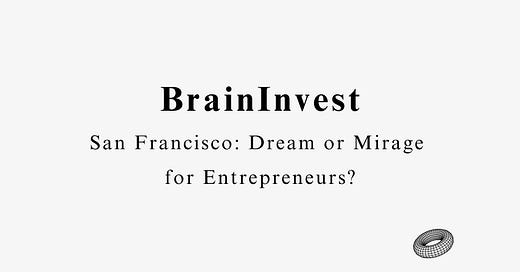San Francisco: Dream or Mirage for Entrepreneurs?
Thank you to all our subscribers! Share your link to unlock some perks — and don’t miss the surprise at the end! 🫶
Should you move to San Francisco to launch your startup? In France, this question is practically a national pastime, like there’s some secret sauce for success simmering in the Silicon Valley. So let’s break it down once and for all.
In my view, three main things should guide this decision: self-perception, where economic value is created, and the ultimate consequences of your ambition.
But first, let’s talk about ambition itself. It’s neither good nor bad – it’s a deep-seated drive for achievement, different for everyone, shaped by our own stories. The key is to frame ambition without judgment: each of us defines it through our unique path.
1. Self-Perception
Building a startup is about giving life to a vision, one that’s closely tied to how we see ourselves and the kind of impact we want in the world. As Sartre said, “We are the sum of the people around us.” If we surround ourselves with people who see the world as a playground for innovation, where boundaries are made to be pushed, our own ambition expands – why not aim to build the next Google, Amazon, or OpenAI?
So, San Francisco isn’t a simple yes-or-no choice. The real question is: which environment will fuel your ambition the most? Where will you find the resources to turn your vision into reality?
2. Location of Value
With globalization and ecosystem specialization, certain hubs have become magnets for innovation, pulling in top talent, major ambitions, and massive funding.
Each destination has its own strengths – San Francisco, New York, and Hong Kong for capital - Stanford, Cambridge, and Polytechnique for talent - Copenhagen, Cape Town, and Paris for quality of life.
To build a high-performing startup, it’s crucial to leverage this global network. Play the game with the world’s innovation hubs, balancing funding, talent, and quality of life for maximum strategic advantage.
3. Strategic Interdependence
Since Covid, we’ve moved away from the days of “happy globalization” and into what we might call “strategic globalization.” These days, relying too much on any one country or key player is a big risk. To limit this exposure, entrepreneurs need to think about controlled interdependence, reducing their vulnerability in a world that’s now full of geopolitical complexities.
In this context, the question isn’t just, “Should I go to San Francisco to succeed?” but rather, “Do I want to build a global leader?” If the answer is yes, then your startup has to go global from day one. Your HQ might be in Delaware to attract investors, with offices in Europe for quality of life and a remote workforce to pull top talent from everywhere. Location is secondary; it’s all about impact. Use the strengths and weaknesses of each market to your advantage.
Go-To-Market: Playing with Giants
Market choice is pivotal. Some countries, like Israel, are so small that startups are practically born with a U.S. focus, drawn by its pro-innovation mindset and easy market access. For other tech sectors, the choice of market is just as strategic. Take micro-nuclear reactors (SMR) – for me, the ideal market is Africa and Turkey, not France, which is investing billions in local players because, hey, it’s already got the tech.
So if you want fast growth, pick the biggest possible market from the start.
Ambition as a Compass
Ultimately, the question of where to launch a startup boils down to ambition and personal philosophy. Global ambitions create global companies; local ambitions create local companies. Go borderless from day one, with a strategy of full geopolitical flexibility.
This is precisely why Entrepreneur First, for example, has its startups in Delaware – to attract more funds and build geopolitical independence. The result? Larger funding rounds and more access to top talent, which means higher performance for Entrepreneur First.
The days of “happy globalization” are behind us; welcome to the era of strategic interdependence – or, as David Baverez would put it, “the age of economic warfare.”
As a thank-you, Cercle Hébé & BrainInvest are offering two exclusive invitations to a cocktail reception on Tuesday, November 26, at 7:30 PM in Paris with Elisabeth Moreno, President of Ring Capital, and Raoul Salomon, CEO of Barclays France. To join, just reply to this email or message me on Substack.
Thanks a bunch for reading this far! Feel free to share this edition (and the previous ones) and enjoy lots of perks: stickers, caps, access to events…
Previous articles you'll love :
Catch you soon!




I really enjoyed this post. One of my favorite blogs.
I do believe that there's a clear lack of spontaneity in innovation that can be missed when a team is too dispersed.
I grew up on the West Coast so I am a bit underwhelmed with moving back to a colder coastline. Foods good there though.
i gave here a few 'personal' reasons behind 'why SF': https://www.theflaneursproject.com/p/returning-home-miracles-and-ambition?utm_campaign=post&utm_medium=web